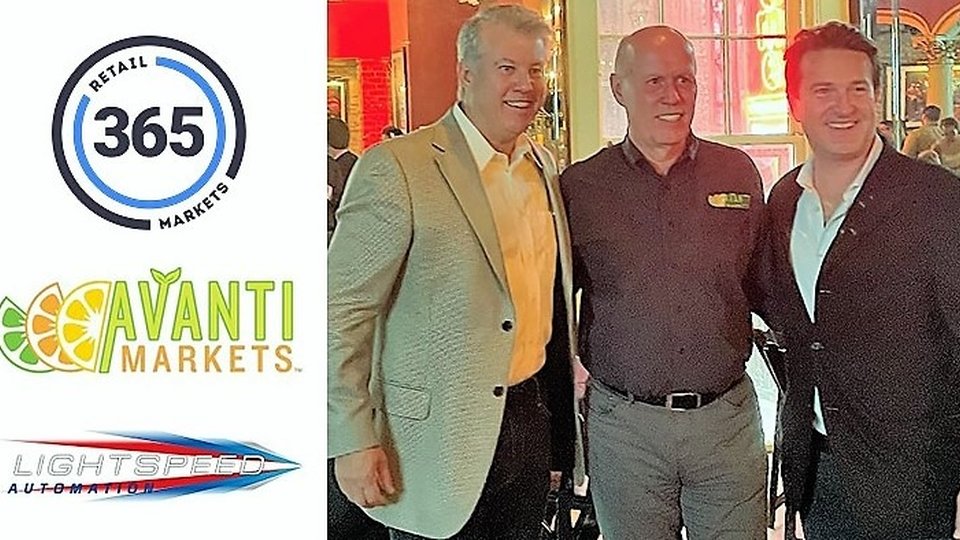Micro Markets
Micro market/technology powerhouse set to boost convenience services
Joe Hessling, founder and CEO of 365 Retail Markets, envisions a big future for the recent merger of his company with Avanti Markets and Lightspeed Automation.

October 20, 2021 by Elliot Maras — Editor, Kiosk Marketplace & Vending Times
The three-way merger of 365 Retail Markets, Avanti Markets and Lightspeed Automation last month creates one of the most significant powerhouses in the convenience services industry as it enters a promising era.
The joining of the two largest micro market companies – 365 Retail Markets and Avanti Markets – creates a clearly dominant player in the fastest growing convenience services sector. The addition of Lightspeed Automation, the country's largest warehouse technology provider, further strengthens the combined companies' innovative capabilities.
Joe Hessling, 365 CEO and founder, Jim Brinton and Randy Smith – former principals of Avanti Markets and Lightspeed Automation, respectively, are now active partners in 365 Retail Markets, which is expected to do $200 million in sales this year with nearly 400 employees.
The merger comes at a time when unattended retail opportunities have exploded, driven by the growth of unattended stores such as Amazon Go and a host of advances in self-service technology.
Since 2006, micro markets have rejuvenated the convenience services industry and are now positioned to emerge from private, enclosed locations to public access environments.
Hessling, CEO of 365 Retail Markets, shared his thoughts on the merger's significance for unattended retail in a recent interview. Following are excerpts of that interview.
 |
| Joe Hessling expects major growth for automation on account of the labor shortage. |
Q. What does this three-way merger mean for the convenience services industry?
A. It means different things to different people.
In terms of the Avanti Markets and 365 Retail Markets merger, it shouldn't change much for operators other than to provide a greater variety of options.
Avanti Markets is more of a strictly micro market product supplier, whereas 365 Retail Markets has vending, coolers, dining, Stockwell (a smart store technology), computer vision and additional products that will be applicable to users. All of these options will now be available to our shared customer base.
With Lightspeed, the merger creates an easier pathway for operators. We are eliminating the extra step operators must often go through when fulfilling their orders. We are removing that friction with our focus on creating a more seamless technology pathway with the Lightspeed integration.
Another key benefit is the development efficiencies that the Avanti and 365 merger will create, which will translate into lower costs overall.
Q. Will the three companies continue under their existing brands?
A. Yes. The brands will stay intact.
Q. Will there be any combining of sales and service organizations?
A.Yes. Sales first, service will come next. By the first of the year we hope to have a reorganized sales and marketing team that supports all products.
Q. Will Jim Brinton and Randy Smith continue in their present roles?
A. Yes. They will also have additional responsibilities with 365 Retail Markets. Randy will be responsible for strategic partnerships and helping 365 Retail Markets do more with the partners that he's already built strong relationships with. Jim will be a voice for 365 for all of the brands.
Q. How will the three companies' manufacturing operations be affected?
A. We will use a combination of SlabbKiosks, a kiosk manufacturer that Avanti Markets acquired recently, and 365 Retail Markets' manufacturing operation in the Detroit area.
Q. Are staff cutbacks planned?
A. We don't anticipate any cutbacks. We have plans to hire 100 more people, mostly in technology, engineering and security – with specific focus on machine learning, computer vision, as well as support and production staff. We're working to keep up with demand and are excited that we can be job creators during this time of change.
Q. Why are you expecting so much growth for the company?
A. The labor shortage is affecting all industries right now. If you're an operator, you can't find warehouse workers, so you're going to need Lightspeed Automation. If you are a café operator and you can't find cashiers, you're going to need our dining self-checkout platform, 365Dining, which is going crazy, and that's because it's a self-checkout platform. If you're a dining location that doesn't have enough employees, you're looking at micro markets. It's all because of the labor shortage and the demand for out-of-store purchases and convenience.
Q. What products do you anticipate will show the most growth?
A. Our computer vision product, PicoCooler product and the PicoMarket are all ways for us to take advantage of the growth of remote retail; these offer the ability to get products outside of a store in convenient locations. Those three technologies are growing incredibly.
Q. 365 Retail Markets has taken a pioneering role with biometric identification. What other technologies will be coming into play more, such as voice recognition, virtual reality or cryptocurrency acceptance?
A. We tend not to go after the "shiny stuff." We've got to make sure the dollars we spend are worth it for the operators that use our product and fit their business models.
Computer vision is without a doubt what we are investing heavily in. Effectively, it just replaces a barcode, and in confined areas and cabinets, it mitigates theft.
Today, we have probably 600 computer vision enabled vending machines in the market. These Stockwell units are cabinets where you present a credit card or a mobile wallet. It allows you to open the door, remove a product, charging you when you close the door.
Micro markets have focused mainly on private, enclosed locations. Every operator I speak with needs something to attack the public access market. Computer vision will play an important role helping in this area.
Computer vision is extremely complex and it's always changing because the brands change packaging and all of a sudden everything changes within the computer vision and machine learning models.
Moving forward, automation is going to be dominated by computer vision, artificial intelligence and machine learning. The other stuff out there is cool but I don't see it as an overwhelming actor in the future of what we do for a living.
(Editor's note: Joe Hessling will be moderating a panel session, "New Self-Service Technologies for a Changing World" during the Self-Service Innovation Summit, Dec. 14-16 in Hollywood, Florida. To register for the Summit, click here.)
About Elliot Maras
Elliot Maras is the editor of Kiosk Marketplace and Vending Times. He brings three decades covering unattended retail and commercial foodservice.
 ChatGPT
ChatGPT Grok
Grok Perplexity
Perplexity Claude
Claude






